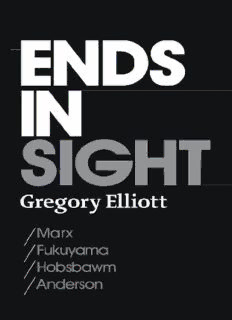
Ends in Sight: Marx Fukuyama Hobsbawm Anderson PDF
Preview Ends in Sight: Marx Fukuyama Hobsbawm Anderson
ENDS IN SIGHT EElllliiootttt 0000 pprree ii 2211//1111//0077 1199::5566::4466 EElllliiootttt 0000 pprree iiii 2211//1111//0077 1199::5566::4466 ENDS IN SIGHT Marx/Fukuyama/Hobsbawm/Anderson Gregory Elliott P Pluto Press LONDON (cid:127) ANN ARBOR, MI and Between the Lines TORONTO EElllliiootttt 0000 pprree iiiiii 2211//1111//0077 1199::5566::4466 First published 2008 by Pluto Press 345 Archway Road, London N6 5AA and 839 Greene Street, Ann Arbor, MI 48106 www.plutobooks.com First published in Canada in 2008 by Between the Lines 720 Bathurst Street, Suite #404 Toronto, Ontario M5S 2R4 Canada 1-800-718-7201 www.btlbooks.com Copyright © Gregory Elliott 2008 The right of Gregory Elliott to be identifi ed as the author of this work has been asserted by him in accordance with the Copyright, Designs and Patents Act 1988. British Library Cataloguing in Publication Data A catalogue record for this book is available from the British Library ISBN 978 0 7453 2763 1 (hardback) ISBN 978 0 7453 2762 4 (Pluto paperback) ISBN 978 1 8970 7140 3 (Between the Lines paperback) Library of Congress Cataloging in Publication Data applied for Library and Archives Canada Cataloguing in Publication Elliott, Gregory Ends in sight : Marx/ Fukuyama/ Hobsbawn/ Anderson / Gregory Elliott. Includes bibliographical references and index. ISBN 978-1-897071-40-3 1. Marx, Karl, 1818-1883. Manifest der Kommunistischen Partei. 2. Socialism. 3. Capitalism. 4. Fukuyama, Francis. 5. Hobsbawm, E. J. (Eric J.), 1917-. 6. Anderson, Perry. I. Title. HX73.E423 2008 335.4 C2007-906315-2 This book is printed on paper suitable for recycling and made from fully managed and sustained forest sources. Logging, pulping and manufacturing processes are expected to conform to the environmental regulations of the country of origin. 10 9 8 7 6 5 4 3 2 1 Designed and produced for Pluto Press by Chase Publishing Services Ltd, Fortescue, Sidmouth EX10 9QG Typeset from disk by Stanford DTP Services, Northampton Printed and bound in the United States of America EElllliiootttt 0000 pprree iivv 2211//1111//0077 1199::5566::4466 In memory of Christopher Hill, past master; and of Joe McCarney, old friend EElllliiootttt 0000 pprree vv 2211//1111//0077 1199::5566::4466 EElllliiootttt 0000 pprree vvii 2211//1111//0077 1199::5566::4466 Contents Preface viii Acknowledgements xii 1. The Sorcerer and the Gravedigger: Karl Marx 1 2. Full Spectrum Dominance? Francis Fukuyama 34 3. In Extremis: Eric Hobsbawm 64 4. Ringing Out the Old: Perry Anderson 91 Conclusion: Starting Over? 116 Notes 128 Bibliography 140 Index 145 EElllliiootttt 0000 pprree vviiii 2211//1111//0077 1199::5566::4466 Preface The fi nal decades of the twentieth century witnessed numerous sightings of a certain ‘end of history’ or the end of a certain history; and – if only implicitly – the inception of another. (To sense an ending is invariably to scent a beginning.) Among them, at least three retain signifi cance for the left, by virtue of the intrinsic interest of their subject matter (the past results and future prospects of capitalism and social- ism), the force of their provocation and the breadth of their perspective. Moreover, Francis Fukuyama, Eric Hobsbawm and Perry Anderson all in some measure took their bearings, if only to plot a contrary course, from Marx, the 150th anniversary of whose most widely diffused text in 1998 found him lauded as seer of capitalist ‘globalisation’. Ends in Sight appraises these historical panoramas, offered from opposing standpoints (one neo-conservative, three variously socialist) and on contrasting scales (political manifesto, philosophy of history, account of the twentieth century, inaugural editorial). Relating them to other writings by their authors, each chapter may stand as a separate composition. But they are scored here as an unwitting quartet. Taking the Communist Manifesto as a founding document of historical materialism, Chapter 1 focuses viii EElllliiootttt 0000 pprree vviiiiii 2211//1111//0077 1199::5566::4466 PREFACE on Marx’s projection of an end of human ‘pre-history’ in communism, delineating his differentiation of ‘scientifi c’ from ‘utopian’ socialism and distilling the verdicts of his descendants, from Labriola on the eve of the twentieth century down to Hobsbawm at its close. The second chapter re-examines Fukuyama’s The End of History and the Last Man (1992), fol- lowing his defection from the intellectual camp most closely associated in public opinion with imperial- ist war in Iraq, and his subsequent efforts (e.g. in the Afterword to a new edition of the book) to edulcorate the original message derived from his inversion of Marx’s ‘materialist conception of history’. Hobsbawm’s dismissive reaction to Fukuyama leads, in Chapter 3, into a discussion of Age of Extremes (1994) and subsequent supplementations of it, most recently in Globalisation, Democracy and Terrorism. Notwithstanding an oblique vindication of the role of communism, the conclusion of the ‘short twentieth century’ as depicted by Hobsbawm is argued to have more in common with various antagonists (including Fukuyama) than its author realises. In Chapter 4, a brief but signifi cant statement – ‘Renewals’ (2000) – by a fi gure who has commented at length on Fukuyama and Hobsbawm is subjected to scrutiny. Resistance to the underlying trend of the times, combined with a determination accurately to refl ect it, is identifi ed as the source of Perry Anderson’s reticence about the ‘alter-globalisation’ movement. Finally, returning to a topic touched on in Chapter 1, a short Conclusion ix EElllliiootttt 0000 pprree iixx 2211//1111//0077 1199::5566::4477
Description: